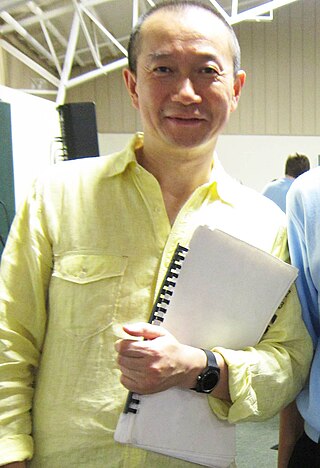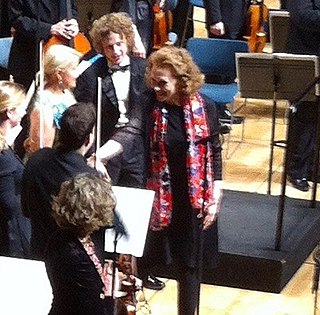
An orchestra is a large instrumental ensemble typical of classical music, which combines instruments from different families. There are typically four main sections of instruments:
Sheet music is a handwritten or printed form of musical notation that uses musical symbols to indicate the pitches, rhythms, or chords of a song or instrumental musical piece. Like its analogs –

IRCAM is a French institute dedicated to the research of music and sound, especially in the fields of avant garde and electro-acoustical art music. It is situated next to, and is organisationally linked with, the Centre Pompidou in Paris. The extension of the building was designed by Renzo Piano and Richard Rogers. Much of the institute is located underground, beneath the fountain to the east of the buildings.

Pauline Oliveros was an American composer, accordionist and a central figure in the development of post-war experimental and electronic music.

Tan Dun is a Chinese-born American composer and conductor. A leading figure of contemporary classical music, he draws from a variety of Western and Chinese influences, a dichotomy which has shaped much of his life and music. Having collaborated with leading orchestras around the world, Tan is the recipient of numerous awards, including a Grawemeyer Award for his opera Marco Polo (1996) and both an Academy Award and Grammy Award for his film score in Ang Lee's Crouching Tiger, Hidden Dragon (2000). His oeuvre as a whole includes operas, orchestral, vocal, chamber, solo and film scores, as well as genres that Tan terms "organic music" and "music ritual."

The Curtis Institute of Music is a private conservatory in Philadelphia. It offers a performance diploma, Bachelor of Music, Master of Music in opera, and a Professional Studies Certificate in opera. All students attend on full scholarship.

The Royal Irish Academy of Music (RIAM) in Dublin, Ireland, is one of Europe's oldest music conservatoires, specialising in classical music and the Irish harp. It is located in a Georgian building on Westland Row in Dublin. An institution which offers tuition from age 4 up to doctorate level, the RIAM has taught music performers and composers who have gone on to acclaim on the world stage. It is an associate college of the University of Dublin, Trinity College.

Kaija Anneli Saariaho is a Finnish composer based in Paris, France. During the course of her career, Saariaho has received commissions from the Lincoln Center for the Kronos Quartet and from IRCAM for the Ensemble Intercontemporain, the BBC, the New York Philharmonic, the Salzburg Music Festival, the Théâtre du Châtelet in Paris, and the Finnish National Opera, among others. In a 2019 composers' poll by BBC Music Magazine, Saariaho was ranked the greatest living composer.

George Emanuel Lewis is an American composer, performer, and scholar of experimental music. He has been a member of the Association for the Advancement of Creative Musicians (AACM) since 1971, when he joined the organization at the age of 19. He is renowned for his work as an improvising trombonist and considered a pioneer of computer music, which he began pursuing in the late 1970s; in the 1980s he created Voyager, an improvising software he has used in interactive performances. Lewis's many honors include a MacArthur Fellowship and a Guggenheim Fellowship, and his book A Power Stronger Than Itself: The AACM and American Experimental Music received the American Book Award. Lewis is the Edwin H. Case Professor of American Music, Composition & Historical Musicology at Columbia University.

The Sibelius Academy is part of the University of the Arts Helsinki and a university-level music school which operates in Helsinki and Kuopio, Finland. It also has an adult education centre in Järvenpää and a training centre in Seinäjoki. The Academy is the only music university in Finland. It is among the biggest European music universities with roughly 1,400 enrolled students.
The Boston Modern Orchestra Project (BMOP) is a professional orchestra in Boston, Massachusetts, United States.

Tod Machover, is a composer and an innovator in the application of technology in music. He is the son of Wilma Machover, a pianist and Carl Machover, a computer scientist.
Joel Thome is the conductor and artistic director of Orchestra of Our Time. A Grammy Award recipient, Thome has been acclaimed internationally as an accomplished conductor and composer of classical and contemporary orchestral music, as well as a strikingly effective conductor of opera and other music/theater works. His conducting credits include many prominent and international orchestras. He has worked with such noted artists as pianists Vladimir Feltsman and Lorin Hollander, violinist Jaime Laredo, Metropolitan Opera singers Florence Quivar and Roberta Alexander. His modern opera performances include the Weill/Brecht Threepenny Opera with the Opera Company of Boston and the Thomson/Stein Four Saints in Three Acts at Carnegie Hall. For thirteen years, Thome led the National Symphonic Orchestra of Mexico in concerts of classical and contemporary works. He has also conducted the Israel Chamber Orchestra, Group L'Itineraire in Paris, Brooklyn Philharmonic, the Orquestra Municipal of Caracas and the Milwaukee Symphony, and has been a regular guest conductor of the Monday Evening Concert Series in Los Angeles.
Virtual orchestra refers to a variety of different types of technologies and art forms. Most commonly used to refer to orchestral simulations, either for pre-recorded or live environments, it also has been used in other ways, such as IRCAM's virtual orchestra database.
Orchestral enhancement is the technique of using orchestration techniques, architectural modifications, or electronic technologies to modify the sound, complexity, or color of a musical theatre, ballet or opera pit orchestra. Orchestral enhancements are used both to create new sounds and to add capabilities to existing orchestral ensembles.
Andrew Hugill is a British composer, writer and academic. He is both a professor of music and a professor of creative computing. He directs the Creative Computing programme at University of Leicester.
Douglas Geers is an American composer, and the founder of the Spark Festival.
Richard Charles Boulanger is a composer, author, and electronic musician. He is a key figure in the development of the audio programming language Csound, and is associated with computer music pioneers Max Mathews and Barry Vercoe.

Vienna Symphonic Library GmbH (VSL) is one of the leading developers of sample libraries and music production software for classical orchestral music. The company is located in a landmark protected building, called Synchron Stage Vienna based in the Austrian capital's 23rd district.
Elma Miller is a Canadian musician, composer, writer and educator.











